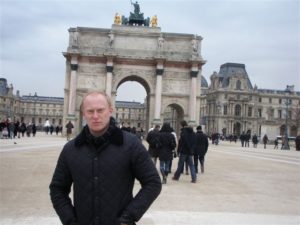Where are they now – Luke McInerney (SPC 1992-97)
March 28, 2017
The College reconnects with Luke McInerney (SPC 1992-97) who is kept busy in his advisory role in the UK Civil Aviation Authority in London working on European aviation policy, and remembers fondly the positive spirit of the Edmund Rice camps.

Luke McInerney.
Where has life taken you since leaving SPC?
Since leaving St Patrick’s College in 1997 I attended the University of Melbourne where I gained a Masters of International Politics and two undergraduate degrees in political science and public policy. During that period I lived on campus at St Mary’s College in Parkville where I was appointed senior tutor. I also served as a post-graduate tutor in the Department of Political Science at the university. My first position was a policy economist at the Australian Federal Treasury in Canberra, where I worked on competition policy and the Australian overseas aid program. Subsequent to that in 2008, I relocated to take up a position at Her Majesty’s Treasury in Whitehall, London, where my work focused on the UK’s response to the financial crisis. As a part of this I participated in the G-20 International Finance Ministers’ Meeting at St Andrews in 2009. Two years ago I took up an advisory position in the UK Civil Aviation Authority where I work on European aviation policy, making me a regular -‘work visitor’ to the EU institutions in Brussels and Paris.- – –
What are your favourite memories of your time at St Patrick’s College?
I would highlight two great initiatives that I was involved in. One was the positive spirit of the Edmund Rice camps, and the other was the Year Ten social justice retreat in Melbourne. The latter is a particularly favourite memory of mine and was where I developed an interest in social justice. In retrospect it was a catalyst for my future participation in St Vincent De Paul activities both in Australia and abroad.-
Which teacher from your time at SPC had the greatest impact on you? Why?
There are a couple of whom I could cite, but I think Mr (Fred) Spittle had an important impact on my interest in history. He inspired me to read widely and be enthused about Australian history. In my spare time I am a writer and researcher of Irish medieval history and I published an academic book on this subject in 2014 -“ in fact we launched it in a castle in Ireland. So I think the genesis of all that had its roots in my St Patrick’s history days.
How has your education shaped your professional life?
Very much so. My career, both in Australia and internationally, would not have been possible without the foundation that St Patrick’s provided. The structured approach to essay writing which was taught by Gerard Murphy in his English Literature classes were invaluable for university; they also went a long way both in both my professional work and in my history writing where much of my writings are submissions to academic journals. Being able to write with authority was one of the many skills which I was taught in that class.- –
How has your time at SPC shaped your personal values and your family life?
My time at St Patrick’s instilled in me a strong sense of social justice which I have pursued since leaving St Patrick’s. For example, it has taken me to India where I was involved in a month long volunteer initiative in Tamil Nadu. St Patrick’s sporting prowess also rubbed off on me, and I was involved in the men’s rowing crews for St Mary’s College. But I think the biggest influence on my outlook on life was enshrined in a little poem that once hung from the classrooms near the old handball courts and – if I recall it correctly -“ read:- -‘When the great scorer comes to mark against your name, he marks not whether you won or lost, but how you played the game’.- –
If you could pass on one message to the students of today, what would it be?
I think success in later life can be attributed to developing the right set of -‘soft skills’ around handling other people and leadership, and so I would recommend to aspiring students to get involved in extra-curricular activities as these help develop those soft skills which will be invaluable for work and personal life. I would also emphasise the importance of languages. Whilst I didn’t pursue French at school (which in hindsight I regret!), I was fortunate to have lived and worked in Russia and Ukraine and have since gained competency in Russian and also Polish. Working in London, and frequently travelling to Europe, is a constant reminder to me of the importance of bi-lingualism in today’s world.
